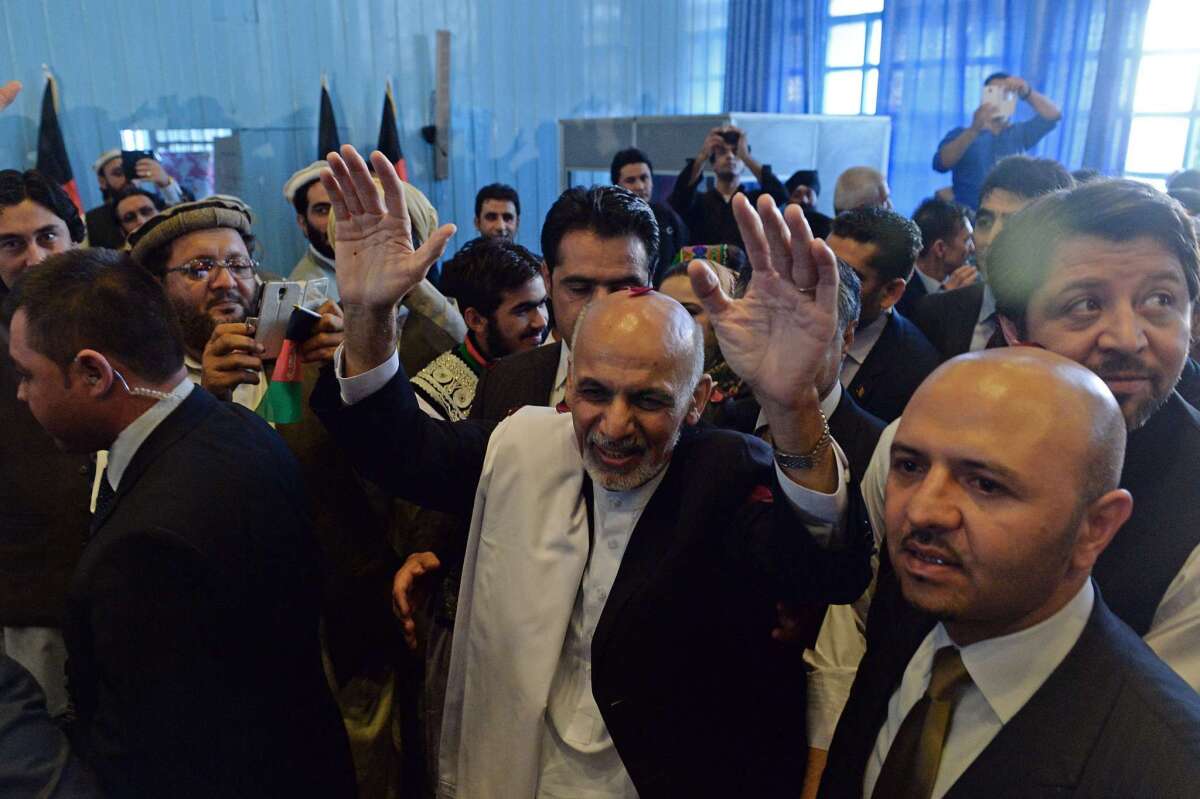Afghan President-elect Ashraf Ghani vows to build a strong government

Reporting from Kabul, Afghanistan — President-elect Ashraf Ghani said Monday that he and rival Abdullah Abdullah would put a bitter election dispute behind them and build a “strong government” despite questions about the stability of a U.S.-backed power-sharing agreement.
“The election process has strengthened our national unity,” Ghani said in his first extended remarks since being announced the winner on Sunday of a controversial runoff vote. He is expected to be sworn in next week. “There is no room for partition or division in the country. We are united and we will remain united.”
Yet a day after Ghani and Abdullah signed an agreement creating a national unity government – in which Abdullah is expected to fill the newly created role of chief executive – many Afghans expressed concerns about whether the delicate compromise would hold given the rancor of the election.
Few Afghans had seen the text of the four-page agreement, which was released Sunday after more than two months of talks that began after Abdullah alleged serious fraud in favor of Ghani in a June runoff election. U.S. Secretary of State John F. Kerry persuaded the candidates to share power after some Abdullah supporters began calling for a parallel government, which many considered a recipe for more political and ethnic turmoil.
“I am happy that it finally marks the end of the election, but only if we know who the president is,” said Yaqoub, an engineer in Laghman province.
Like many Afghans, the 30-year-old Yaqoub, who has only one name, worried that attempts to split authority between two politicians with powerful allies would only further destabilize a country that is dealing with the impending withdrawal of U.S.-led international forces, Taliban advances in the north and south and a massive unemployment rate.
The agreement, in which Ghani keeps all the constitutional powers of the presidency but gives the chief executive some responsibility for implementing policies, came after intense pressure from President Hamid Karzai, President Obama, Kerry and other leaders. U.S. officials warned the candidates that failure to reach a deal could jeopardize billions in U.S. funding for Afghanistan.
In Afghanistan’s political system, the president wields expansive powers, particularly over the appointment of federal, provincial and local officials, and many analysts said Ghani’s and Abdullah’s campaign teams were each expecting the spoils of victory. It often was not the candidates but their running mates and political allies – including powerful governors, ministers, militia leaders and religious figures – who held up a compromise, sources familiar with the negotiations said.
Making matters murkier was the fact that Afghanistan’s Independent Election Commission has not officially released the results of the runoff following a United Nations-supervised audit of all 8 million ballots cast, although leaked results showed Ghani with a 55% to 45% victory. U.N. officials said Monday that the IEC was “committed to publishing the full results in due course.”
State Department spokeswoman Jen Psaki acknowledged that the audit did not reveal “the full extent of the fraud” but said “the final outcome of the election process is legitimate.”
But Sardar, a 30-year-old journalist in northern Kunduz province who also uses only one name, said that after years of U.S.-backed efforts to build democracy in Afghanistan, an election whose results are not released and a runner-up who is awarded a new executive position seem to circumvent true democracy.
“If the president wants to give some of his powers to someone else, he can,” Sardar said. “But not before he even steps into the presidential palace.”
Ahmad Nader Nadery, chairman of the Free and Fair Elections Foundation of Afghanistan, an independent watchdog, said Afghans were justified in feeling left in the dark about how the election was resolved. He criticized election authorities for mishandling the process and committing fraud in favor of both candidates, saying there was “no reason” for the final results to be withheld.
“The people, the millions, who participated by casting their ballots, they should have been the deciding factor of this election,” Nadery said.
Hamid Mohammad, a 20-year-old resident of Bamiyan province in the north, said that he had serious doubts about the sustainability of a government that brings together powerful men from two rival camps.
“With so many strong figures backing both of them I don’t see how they can work together,” Mohammad said.
The Taliban, for its part, condemned the new government as the latest American “plot” in Afghanistan.
“Just as its process was bogus and humiliating, so is its result shameful,” the group said in a statement.
Latifi is a special correspondent. Times staff writer Bengali reported from Varanasi, India.
Twitter: @SBengali
More to Read
Sign up for Essential California
The most important California stories and recommendations in your inbox every morning.
You may occasionally receive promotional content from the Los Angeles Times.











